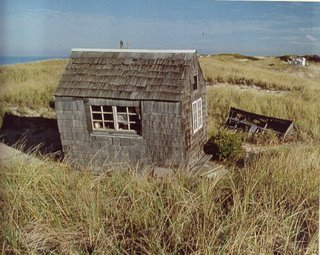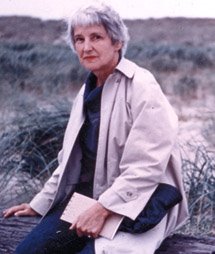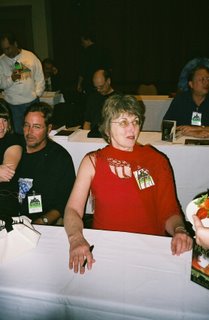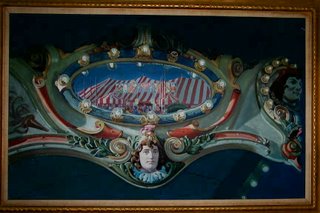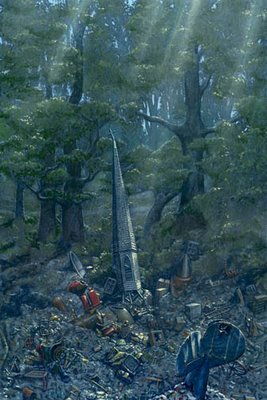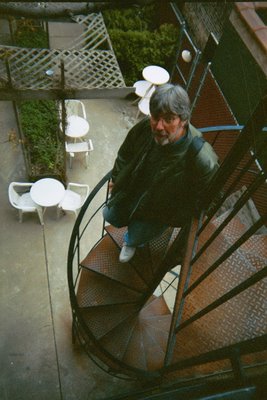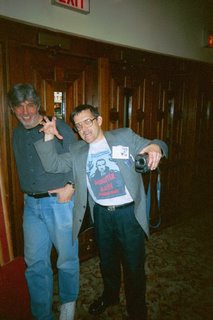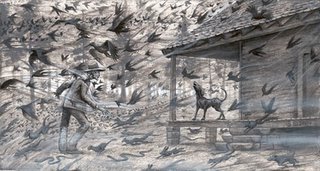
A long, long time ago, when there were wolves in Wales, and I was very, very young, I took a foolish, foolish job. I was in theater at the time and working in Philadelphia. I acted, directed, did any gig I could get. Philly is close to New York. So close -- a hundred-plus miles -- so that those with bright hope and talent eventually went from Market or South Streets north to Broadway or the Village. Those who stayed behind -- or came back -- were either sad failures or the passionate but utterly uninitiated of us. That was the assumption.
...Okay, Andre Gregory was in Philly, but that's another story...
The well-heeled theater-going public of Philly pretty much ignored local efforts and hopped onto the Jersey Turnpike or Amtrak'd their way up to NYC to ease their showgoing Joneses.
I had just graduated from the theater school of Temple University and was considering my next step. Steps. I was married and had commitments to family, city and friends. That's what we told ourselves, Ernestine and I. Excuses, I fear, for not doing things.
Directing was the only thing I really wanted to do. If not that, then, nothing! Problem was, as an unknown in Philly, you were an actor. That was it. When people got to know you, then you got to direct. An ancillary problem was that anybody who had theater gigs to hand out and who didn't know you assumed you were either one or other of the abovementioned -- sad failure or hopeless naïf.
One could always start a company of course. That meant devoting yourself to fundraising, handshaking, butt-kissing, record keeping, the thankless pointlessness of audience building, and its sister shame, press relations/marketing...all that and more.
I had no urge to start a company. No, no. I was a director, not a businessdude.
Understand: I was not kid. I was young, but was not a child; I was just out of school, but had knocked around in professional and were-professional theater for more than a dozen years on three continents. I had some underdeveloped and largely unrecognized talents and some talents that had already been recognized -- just not so anybody in Philly had recognized.
An old chum from Temple HAD started a company. Fritz was his name, Etage was the company. That’s French for "stage" -- that was Fritz. Fritz was producing and directing a play from a new script by another Temple chum, a guy named Ivan. I was asked by both producer and writer to play the lead in what was to be Etage's first effort, "Terminal."
Fritz lived and worked in a vast, dark, ratty warehouse. The building was probably from the tail end of the 19th century and butted, literally, to the docks and lay in the shadow of the Ben Franklin bridge. The show would be rehearsed, built and performed in what amounted to Fritz's living room, said room being some 150 feet long, about 40 wide and 20 or so tall. It was big, dirty, echoic and open. Not bad, actually, as rough theater spaces went in those days. Brick, nitre and hoarfrost; tiny little feet when the lights went out. All the stuff to keep you honest and not let you get too far above yourself.
Ivan, our writer/money guy, had been around. He had just graduated from Temple, and, like I, he was older and more experienced than most of the students in the department. Ivan, in fact, had quite a few chops as a record producer and rock'n'roll promoter. At this time in his life, however, Ivan was seeking “respectability.” He somehow assumed the mantle of "playwright" would bestow that upon him. Silly fellow.
Toward that end, he had written "Terminal" and was using rock and roll bucks to finance the effort.
Trouble was, "Terminal" sucked. Cavernously.
The first read-through showed the script needed an act III gut rehab, a new act II, and an actual act I -- just to get it all rolling. That was it. Not re-writes. Needed were Acts I, II, and III.
It also needed reason to exist. It was the worst sort of absurdist masturbation: seemingly intellectual and passionate while being neither intelligent nor heartfelt – and it didn’t even give a good tingle at the end!
It did provide opportunities for boy and girl actors to scream, cry, fight, cuss, agonize, head-bash, breast beat (on one’s self and others), it allowed for perversion -- real and imagined -- and offered a full range of options for face-making, funny-walking and gutteralizing the English language.
The cast featured mostly kids, kids just starting at Temple or elsewhere, or street kids who'd learned a few garage band rock and roll licks or had done a couple community theater gigs before becoming disillusioned because their parents actually LIKED the shows they’d been in. Most of us had drifted down to the docks under the big suspension bridge to Camden, to do something real, something meaningful, something that reeked of sweat and tasted of gut, something that explored meaninglessness and showed how tough they were, alone, and in the face of it all.
Like I said: Kids. Like we all were, once.
I was assured. The script would be fixed. This was a starting point. This was a framework. Ivan was there. Fritz and Ivan, with the cast, would take it apart and put it all together. We’d be okay. Really.
Never happened.
I rode through five weeks of rehearsal, sometimes enduring the passion, the sweat, the committed anger of the young and needy actors, sometimes not. All the while I worked against my growing and deeply dismal realization that this play had begun life as a piece of shit, it remained a piece of shit, and would for all time and forever be a reminder -- imbedded in my recollection and in the memories of all who would gauge my work from this monument from this time forth -- that I, too, had shit potential.
To my credit I walked out once.
To my discredit, I came back.
About the play: “Terminal” was set in a deserted and devastated air terminal. Was the devastation because of a war, social upheaval, some apocalyptic event?
I didn't know. Fritz didn't know. Ivan didn't know but was certain it didn't matter.
I was playing "The General." The guy who ran things, the guy who had to keep it all going. I had at my command a sexy blonde babe and her pal, a hunchbacked circus dwarf/baggage handler. The actor playing the dwarf, while short, stood well within "normal" height range. He didn't believe in "faking" anything on stage so his dwarfishness and the huched-back part of his performance would have to come out of his intense "search" for his character in the rehearsal process.
A few other human oddities worked for me in this place. I've forgotten them, now.
As with a lot of Hollywood movies from the 30s, 40s and some early live television that had been cribbed from Hollywood movies of the 30s and 40s, there were also a few travelers that showed up at this strange facility. These were people who suddenly found themselves in this terminal. “They’re waiting, see...?”
“Waiting for what?”
“Well! I don't know...for a plane...a journey someplace, someplace, I don't know where..."
Like that.
“Are they dead...”
“Maybe they're dead!” Ivan told us. “Maybe they're not. Great, huh?”
“Is this sort of...well... Existential?”
“...”
“Like, say, ‘No Exit’ or somthing...?”
“Well...no...”
Anyway. I had a lot of speeches. Long speeches. I got to roam the playing area -- I climbed to the rafters on scaffolding, chasing my dwarf, I crawled the floors like an agonized serpent, or a uniformed Caliban sans-fins. I oozed up through trapdoors -- which were real -- rats and bugs at my heels -- also real. I wandered among the imagined audience-to-be no doubt making people nervous that I was going to make them do something silly (assaulting the audience was big in those days).
I got to deliver one very gentle, very soft speech while standing over our sleek blonde flight attendant, Lisa (heroin-chic before there was a Calvin Klein) -- while slowly slipping both hands down the front of her dress, finishing the thing while kneading her exceptionally chic-to-imaginary breasts...
You had to have been there.
All right? I was embarrassed by almost everything I had to do in this show. I had, however, committed to doing it. Ah well.
Opening night. Of all things, we had a full house. It was packed. Mostly paper, but it was full of Fritz's family, chums, the cast's pals, guys from Temple, former teachers. The range.
I told my wife to wait...wait until it settles in...
Uniquely, I was not nervous. I usually have stage fright that pushes the edge of cardiac infarction. That’s when I care, of course.
About this... Well, I wasn’t nervous. The rest of the cast went through the usual backstage verbal, physical and psychological hoop-jumps, the stuff that makes being backstage early a the run feel like you’re in the waiting room at a vet's office.
Ivan had pulled strings. He'd gotten a whole mob of his rock'n'roll pals and associates to Philly and to this thing. Most disturbing of all, the press was there -- the Daily News, Inquirer, Daily Planet, all the local and out of town papers were covering this little event!
Shit. I was finished.
I did the show stops pulled. Balls out. Hannibal Lector on a buzz trip, bennies, downers, uppers, screamers. Shameless. Shameless.
Somewhere in there, I lost myself. Somewhere in the midst of it all, I dropped off the face of friggin' Philadelphia and into some other place. I don't know if it was Ivan's Terminal, but it wasn't Etage under the Ben Franklin bridge.
Then the thing was over. We took our bows and got ready to party.
I came up for air, changed out of the costume -- my old Air Force officer's uniform (I say it was my old "officer's uniform" because, while I was but a Sergeant in the USAF in Europe, my officially designated work uniform was that of an Air Force Captain. I'll explain that another time) -- shoved my hair back, slipped upstairs from the basement green room and joined the party. Maybe nobody'd notice.
Live band. Lotsa booze. Catered. Good grub. Well-dressed audients and class-act dishes. Mainline slinks and uptown slipperies.
I avoided my fellow Terminalites. By this time, I didn't much like them, and they were, mostly, afraid of me.
I grabbed a dozen 7-oz Rolling Rock ponies, and slipped into the front lobby where it was quiet and dark.
Sulking.
The party was a muffled headache away. I snuggled over by the window that looked over the street, the dirty street by the River, and sucked down a couple Rocks.
Ahhh. Good.
I had no idea she had arrived. I turned and there she was. She was funny looking, bony, angular. She was in a kind of combination hip-hop, shimmy shammy, snuggle-up twitchy state. It seemed focused on me. She stood inches from my face and gushed. Her head wig-wagged back and forth as she oozed about my...my performance....one foot, the other foot. I was really, oh man you gotta know but probably don't know because you were so far in it there, but you really gotta know what you did there and I want to tell you you were just mind-blowing, man, fucking great. Like fucking THAT great.
Her eyes gripped mine, held through all her twitchings, rockings and bobbings. Somehow her eyes...her eyes locked onto mine...her eyes never moved, lidded, sexy, sensual...despite it all...they hung on...she vibrated...here eyes were quiet, waiting...that was it...then she waited with...waited with...waited...with her eyes.
"Thank you," I said. I thought that was appropriate. Thought that was about right. "Uh-huh... thanks. Glad you enjoyed."
No. I didn't think, "enjoyed" was the word, not the kind of thing "Terminal" was about... Enjoyment. No.
Then she slipped away.
I was flattered.
A bit confused. I was taken by this funny person's ability to flow in and out, go with the mood and be gone with the music beating at the walls from inside the theater.
"Well, okay," I said to myself, "how bad could I have been?"
How bad could I have been?

Fluffed with myself, I went back to the party.
When I got back, my dwarf and chic Lisa (who, since the first week of rehearsals seemed to have become joined at the groin), snatched me into a corner. Asked what she had said, what had she said...?
“Who?”
“Patti for Christ-sake.”
“Who Patti? Patti who?”
“Patti Smith, Christ! What had she said?”
“Oh. Uh...she liked it.”
I had no idea. At the time (and to this day deep inside my soul of souls) I consider any music written after1850 to be the spiritual precursor to the fall of civilization, Armageddon's marching tunes.
At this time, Patti Smith was only a step beyond being a proto-punk poet and crypto-neuve-wavo journalist cum Sam Shepard fuckee from deepest New Jork City.
She had, however, just cut a first record. She was a growing legend. Noted and known. And (best of all) known in only the hippest circles. Which, of course, most certainly did not include me.
My "Terminal" colleagues -- in the hippest of circles -- could scarcely believe that I didn't know who she was. Some proclaimed me to be feigning a greater ignorance than that which I possessed.
Terminal got lousy reviews.
I got a few good ones -- of the "one bright-spot-in-this-dark-and-dismal-night" variety.
...and that was that.
I watched Patti Smith with some interest after that. Then I forgot her.
In recent years, I've listened. I've come to appreciate her. I like her work. I like thinking about her. I've seen her, since. Actually gotten her autograph -- been that close. I never said what I wanted to say: "Hi. I'm Larry Santoro. You're a big fan of mine." I'm glad I didn't.
But! I wish her enthusiasm at the time had given me an appreciation of me at the time.
It did not do that.
Alas.

All images of Patti Smith are by Robert Maplethorpe











